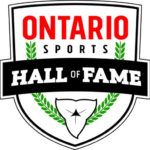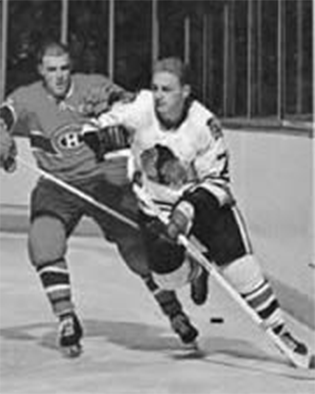Robert Marvin “Bobby” Hull OC (born January 3, 1939) is a retired Canadian ice hockey player. He is regarded as one of the greatest ice hockey players of all time and perhaps the greatest left winger to ever play the game.
Hull was famous for his blonde hair, blinding skating speed, and having the fastest shot, earning him the nickname “the Golden Jet”. He possessed the most feared slapshot of his day. In his 23 years in the National Hockey League and World Hockey Association, he played for the Chicago Black Hawks, Winnipeg Jets and Hartford Whalers.
NHL career
Hull quickly blossomed into a star, finishing second in the rookie of the year balloting his first season. Hull originally wore numbers 16 and 7 as a Blackhawk but would later switch to his famous number 9, a tribute to his childhood idol Gordie Howe. By his third season, he led the league in goal- and point-scoring. He went on to lead the Chicago Black Hawks to the Stanley Cup in 1961—their third overall (and most recent) and first in 23 years. He and teammate Stan Mikita were the most formidable forward duo of the Sixties, notorious for curving the blades of their sticks. Armed already with a blazing, heavy shot, his curved blade caused the puck to veer high and at all different angles. Hull’s ability to harness the blade’s unpredictability would make it one of hockey’s most memorable signatures.
Although he was only 5’10” in stature, Bobby had a solid build (he grew up on a dairy farm) and his playing weight was 185 pounds. His electrifying style would make him one of hockey’s first international superstars and arguably the NHL’s marquee star of the Sixties.
On March 12, 1966, he became the first NHLer to score more than 50 goals in a season, surpassing Maurice Richard and Bernie Geoffrion’s hallowed mark of 50 goals. His 51st goal against the New York Rangers earned him a seven-minute standing ovation from the Chicago Stadium faithful. (After the game Rangers’ goalie Cesare Maniago claimed that the Black Hawks’ winger Eric Nesterenko had interfered with him during the play: “Nesterenko got the blade of his stick under mine and kind of lifted it and pushed it aside, and the puck got past my stick on the left side.”) Hull would eventually score 54 goals that season, the highest single season total of the Original Six era. He led the league in goal scoring seven times during the Sixties. Despite Hull breaking his own record by four goals in 1968–69, the Hawks missed the playoffs for the first time since his rookie season. By his final NHL season, he had scored 50 goals or more a remarkable five times, only one fewer than every other player in history who had done so combined to that date.
His slapshot was once clocked at 118.3 mph (190.4 km/h) and he could skate 29.7 mph (47.8 km/h).
WHA career
Long unhappy because of his relatively poor salary in the period when he was hockey’s preeminent superstar, Hull responded to overtures from the upstart World Hockey Association’s Winnipeg Jets in 1972 by jesting that he’d jump to them for a million dollars, a sum then considered absurd.
Gathering the other league owners together to contribute to the unprecedented amount on the grounds that inking such a major star would give instant credibility to the new rival league that was competing directly against the entrenched NHL, Jets’ owner Ben Hatskin agreed to the sum, and signed Hull for a contract worth $1,000,000 over ten years. Although his debut with Winnipeg was held up in litigation by the NHL, Hull instantly became the WHA’s greatest star, and with Swedish linemates Anders Hedberg and Ulf Nilsson formed one of the most formidable forward lines of the 1970s (known as “The Hot Line”), leading the Jets to two AVCO Cups during his time with the club. His best year was 1975, when he scored 77 goals to set a new professional mark.
Because he joined the rival league, Hull was not allowed to represent Team Canada in the 1972 Summit Series. However in 1974 he got his chance to play on the international stage when he suited up for the WHA team representing Canada in a series against the USSR national team. The WHA lost the series four games to one (three ending in a tie), despite Hull’s seven goals. He was a key member of the Canadian squad that won the 1976 Canada Cup, though, scoring five goals in seven games.



